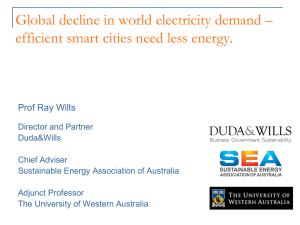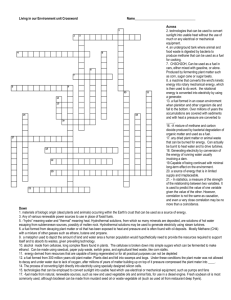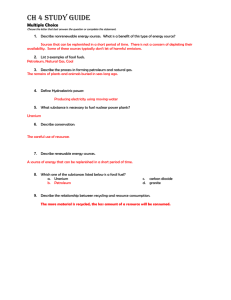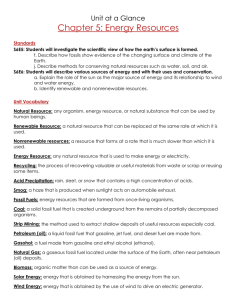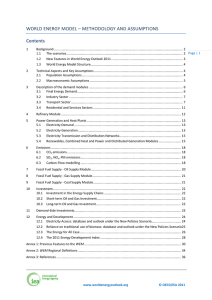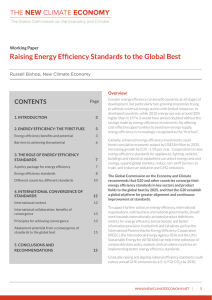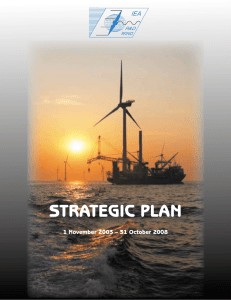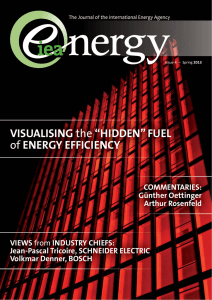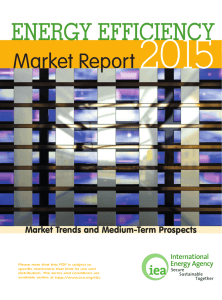Wind Energy Development SOUTH AFRICAN NEET WORKSHOP Current Status and Future Challenges
advertisement
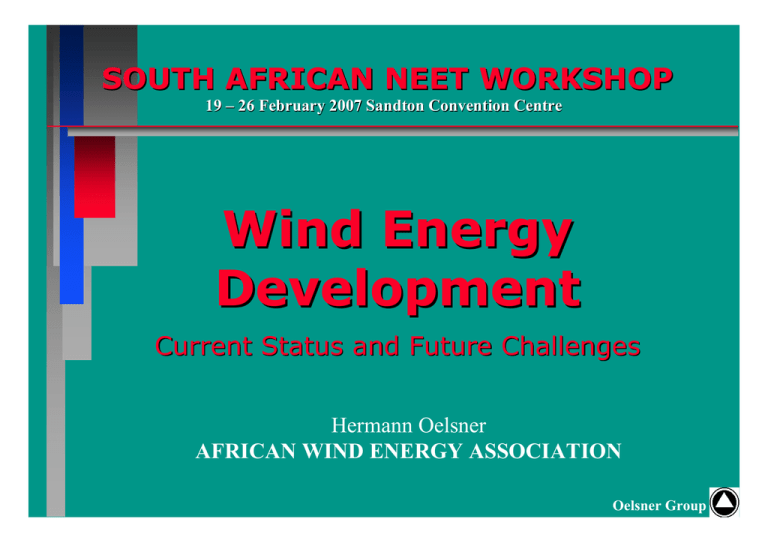
SOUTH AFRICAN NEET WORKSHOP 19 – 26 February 2007 Sandton Convention Centre Wind Energy Development Current Status and Future Challenges Hermann Oelsner AFRICAN WIND ENERGY ASSOCIATION Oelsner Group The Conference Circus Oelsner Group Darling WF First Phase 5,2 MW Oelsner Group Global Wind Potential Gütsch, Andermatt Utgrunden Schweden US-Windfarm Source: Cristina Archer, Mark Jacobson/Stanford 2005 Oelsner Group Wind Regimes of Africa UNEP GEF Solar and Wind Resource Assessment SWERA Oelsner Group Wind Resource Assessment Example South Africa: Abundant wind - coastlines Wind Atlas: 4 m/s at 10 m West Coast: 8,5 m/s at 50 m Karoo 200 place names 39 “windhoeks” South African Wind Energy Status 2004 Wherever you go you see them Wherever you see them they go 30 000 Windmills Oelsner Group Eskom Klipheuvel Eskom installed capacity ~ 40 000 MW Worldwide wind turbine capacity > 31000 MW 2002 Eskom national peak demand ~ 31928 MW - 08 July 2003 evening peak Klipheuwel = 3.16 MW Capacity factor: 13.43 / 13.56 / 8.84 % Oelsner Group SA Wind Potential: 70 000 MW+ Statistics Population (est.2005) Area Km² GDP (US$) Germany 82,438,000 357,050 30,579 South Africa Population (est.2005) 47,432,000 Area Km² 1,221,037 12,161 GDP (US$) www.wikipedia.org Information Day - Berlin January 2007 4 Compare Fossil Fuel with Renewable Energy Resources Myth No. 1: Fossil fuels are inherently more economical • This ignores what is economically relevant prior and following the generation process • Conventional energy subsidies currently amount to $300 billion/a Myth No. 2: RE cannot supply all our energy needs • Every year the sun delivers 15 000 time more energy to the earth than is consumed by the entire human population: 35 000 000 000 000 000 kWh/a Oelsner Group Crude Oil Supply Chain 1. Extraction, 2. Transport 3. Refineries 4. Waste Disposal 5. Storage 6. Shipping 7. Fuel combustion in engines, furnaces, power stations. OIL PEAK Texas oil fields 1975 – North Sea rigs peak 2004 Oelsner Group Opec Spare Capacity 1970-2005 Oelsner Group IEA on Oil Price Increases “Oil prices will come down and renewables won’t make it.” • It is shortsighted. • It suggests wait-and-see attitude to consumers. “Wait a year or so and everything will be as ever” • we are told by the oil industry, with oil supply on the rise and renewables still called “too expensive”. Renewables barely exist in the official agenda of IEA: you will not find a serious preview for wind power in the new World Energy Outlook 2005, and you find no reliable data on other renewables. Ref. „Parlamentarians and the Energy Conflict“ Conflict“ by Rudolf Rechsteiner Oelsner Group Natural Gas Supply Chain •1. Extraction, •2. Liquidification •3. Transport •4. Storage tanks •5. Distribution •6. Fuel combustion in power stations GAS CLIFF 40 % Price Increase Oelsner Group Coal Supply Chain •1. Extraction, •2. Refining •3. Waste Disposal •4. Shipping •5. Fuel combustion in power stations 30 YEARS SUPPLY in SA at todays mode of extraction Oelsner Group Nuclear Supply Chain 1. Extraction 2. Transport 3. Refining 4. Transport 5. Process 6. Transport 7. Enrichment 8. Shipping 9. Power generation INCOMPLETE BUSINESS PLAN needs significant help to cover liability insurance Uranium is not an unlimited resource Oelsner Group Wind & Wave Supply Chains - Electricity chain begins at the power station. - Only one link in the chain. - No decommissioning costs - No waste SUSTAINABLE AND FUEL IS FREE OF CHARGE Oelsner Group Finance Structure Cost- and pay-back-structure of renewables High initial capital cost, low fuel,O&M-costs bring inital income shortfall and golden end Total Generation Cost Cent/kWh 350000 market price 300000 shortfall of income red ink 250000 start Golden end 200000 150000 Operation & Maintenance 100000 Depreciation Interests 50000 0 1 years of operation 3 5 7 9 11 13 15 17 19 21 23 25 27 29 31 33 35 37 39 Economic Benefits Advantages over Centralised Generation: • Lower transmission costs • Lower transforming and distribution costs Pollution related external costs from fossil fuel power generation are avoided • Higher health service costs • Increased cost of food and farm products Energy Pay-back period Job Creation 10w – 4c – 1n Foreign Investment and Export Potential Clean Development Mechanism (CDM) Oil – GDP EFFECT (Shimon Awerbuch) www.awerbuch.com Oelsner Group Strategic Benefits Prevent Power Cuts in Central System Faults Earth Quakes / Natural Disasters Less likely Target of War and Terror Short Lead Times to ease Western Cape crises Decreasing Cost in long term (0 fuel cost) Geopolitics: Security of Supply: RISK! Oelsner Group Opposition to use Wind Energy Multi Nationals loosing control of energy resources Monopoly of local Utility is loosing business to Independent Power Producers Loss of income to Municipalities from end users No room for corruption and fraud Oelsner Group Wrong and Misleading Advice IEA International Energy Agency (IEA) – Intergovernmental organization for fossil fuels EIA Energy Information Agency (EIA) – Part of the US-Department of Energy (DOE) USGS U.S. Geological Survey – Scientific information on resources/geology IAEA International Atomic Energy Agency – Founded in 1957 Promotion of Nuclear Power Oelsner Group IEA-Outlook and Reality GW 250 Windforce 10 (2020 10 % electricity share) [1999] 200 150 100 50 0 1980 IEA World Energy Outlook 1998 Reality 1999 1990 2000 10 20 Oelsner Group IEA-Outlook and Reality GW 200 180 160 Windforce 10 (2020 10 % electricity share) [1999] 140 IEA World Energy Outlook 2002 120 100 80 60 40 Reality 1999 20 0 1980 IEA World Energy Outlook 1998 1990 2000 10 20 Oelsner Group Capacity in different market scenarios 1998-2030 Ref. „Parlamentarians and the Energy Conflict“ Conflict“ by Rudolf Rechsteiner Oelsner Group Denial of Global Warming “Reputable” publications (f.i. Engineering News, Business Day, Maverick) as well as learning institutions have even today not ceased to deny the existence and effect of global warming Oelsner Group Conclusion Recognise and accept that nobody wants to sell or tax less electricity (wealth) or loose control of the market (power), but it is now happening (EE+DSM): • Significant increases in kWh costs are unavoidable World-wide, RE projects can only be implemented within a legal framework created by government to account for external costs and to care for the environment and its people Oelsner Group Recommendation Introduce: • Fair competition in electricity generation to encourage RE • • • • • IPP Feed in tariffs for RE generated electricity Taxes on oil and gas, so that local producers can implement biomass,geothermal, solar and wind Stop funding for nuclear and fossil research and nonrenewable infrastructure Net-metering for domestic applications Mini-grids for rural off-grid applications Oelsner Group Wind and Wave: free, clean and save Thank You Oelsner Group

